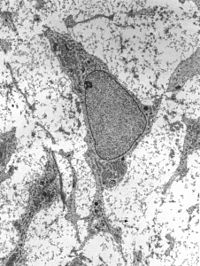
HSC and iPS cell-derived CAR-NK cells as reliable cell-based therapy solutions.
Sign Up to like & getrecommendations! Published in 2021 at "Stem cells translational medicine"
DOI: 10.1002/sctm.20-0459
Abstract: Hematopoietic stem cell (HSC) and induced pluripotent stem (iPS) cell-derived natural killer (NK) cells containing engineered functions, such as chimeric antigen receptors (CAR), offer great promise for the treatment of seemingly incurable oncological malignancies. Today,… read more here.
Keywords: hsc ips; cell derived; ips cell; cell based ... See more keywords

Scalable Measurements of Intrinsic Excitability in Human iPS Cell-Derived Excitatory Neurons Using All-Optical Electrophysiology
Sign Up to like & getrecommendations! Published in 2018 at "Neurochemical Research"
DOI: 10.1007/s11064-018-2694-5
Abstract: Induced pluripotent stem (iPS) cells offer the exciting opportunity for modeling neurological disorders in vitro in the context of a human genetic background. While significant progress has been made in advancing the use of iPS… read more here.
Keywords: excitatory neurons; derived excitatory; cell derived; human ips ... See more keywords

Allele-Specific Biased Expression of the CNTN6 Gene in iPS Cell-Derived Neurons from a Patient with Intellectual Disability and 3p26.3 Microduplication Involving the CNTN6 Gene
Sign Up to like & getrecommendations! Published in 2017 at "Molecular Neurobiology"
DOI: 10.1007/s12035-017-0851-5
Abstract: Copy number variations (CNVs) of the human CNTN6 gene caused by megabase-scale microdeletions or microduplications in the 3p26.3 region are often the cause of neurodevelopmental disorders, including intellectual disability and developmental delay. Surprisingly, patients with… read more here.
Keywords: intellectual disability; cntn6 gene; ips cell; expression ... See more keywords

Enrichment of high-functioning human iPS cell-derived hepatocyte-like cells for pharmaceutical research.
Sign Up to like & getrecommendations! Published in 2018 at "Biomaterials"
DOI: 10.1016/j.biomaterials.2018.01.019
Abstract: Human iPS cell-derived hepatocyte-like cells are expected to be utilized in pharmaceutical research. However, the purity of high-functioning hepatocyte-like cells is not high enough. In particular, the purity of cytochrome P450 3A4 (CYP3A4), which is… read more here.
Keywords: hepatocyte like; like cells; human ips; ips cell ... See more keywords

Establishment of an induced pluripotent stem (iPS) cell line from dermal fibroblasts of an asymptomatic patient with dominant PRPF31 mutation.
Sign Up to like & getrecommendations! Published in 2017 at "Stem cell research"
DOI: 10.1016/j.scr.2017.10.007
Abstract: A human iPS cell line was generated from fibroblasts of a phenotypically unaffected patient from a family with PRPF31-associated retinitis pigmentosa (RP). The transgene-free iPS cells were generated with the human OSKM transcription factors using… read more here.
Keywords: prpf31; cell line; ips cell; establishment induced ... See more keywords

Generation of a human iPS cell line (CGMH.SLC26A4919-2) from a Pendred syndrome patient carrying SLC26A4 c.919-2A>G splice-site mutation.
Sign Up to like & getrecommendations! Published in 2019 at "Stem cell research"
DOI: 10.1016/j.scr.2019.101524
Abstract: SLC26A4 is the second most frequent gene implicated in congenital hearing loss after GJB2 mutations. Here, we report the generation of induced pluripotent stem cells (iPSCs), from a patient who was carrying a homozygous c.919-2A>G… read more here.
Keywords: cell line; human ips; patient carrying; ips cell ... See more keywords

Generation of human iPS cell line CBTCi001-A from dermal fibroblasts obtained from a healthy donor.
Sign Up to like & getrecommendations! Published in 2019 at "Stem cell research"
DOI: 10.1016/j.scr.2019.101630
Abstract: Human-induced pluripotent stem cell (hiPSC) CBTCi001-A line was generated from a healthy 30-year old male dermal fibroblasts using non-integrative reprogramming method using episomal-based plasmids expressing OCT4, SOX2, KLF4, and MYCL. Characterization of CBTCi001-A was confirmed… read more here.
Keywords: line; human ips; ips cell; cbtci001 ... See more keywords

Generation of nonviral integration-free human iPS cell line KISCOi001-A from normal human fibroblasts, under defined xeno-free and feeder-free conditions.
Sign Up to like & getrecommendations! Published in 2021 at "Stem cell research"
DOI: 10.1016/j.scr.2021.102193
Abstract: KISCOi001-A is a healthy feeder-free and fully characterized human induced pluripotent stem (iPS) cell line cultured under xeno-free and defined conditions. The cell line is generated from normal human foreskin fibroblasts with non-integrating episomal plasmid… read more here.
Keywords: cell line; line; feeder free; ips cell ... See more keywords

Functional analysis of CX3CR1 in human induced pluripotent stem (iPS) cell‐derived microglia‐like cells
Sign Up to like & getrecommendations! Published in 2020 at "European Journal of Neuroscience"
DOI: 10.1111/ejn.14879
Abstract: Microglia are the primary immune cells of the central nervous system and crucial to proper development and maintenance of the brain. Microglia have been recognized to be associated with neurodegenerative diseases and neuroinflammatory disorders. CX3C… read more here.
Keywords: cx3cr1 human; cell derived; like cells; ips cell ... See more keywords

Modeling mental disorders in a dish
Sign Up to like & getrecommendations! Published in 2023 at "Psychiatry and Clinical Neurosciences"
DOI: 10.1111/pcn.13552
Abstract: In Japan, there are approximately 1.5 million patients with schizophrenia, 3 million patients with mood disorders such as depression and bipolar disorder, and 840,000 patients with developmental conditions such as autism spectrum disorders. Given that,… read more here.
Keywords: cellular pathogenesis; ips cell; molecular cellular; pathogenesis mental ... See more keywords

Mind the translational gap: using iPS cell models to bridge from genetic discoveries to perturbed pathways and therapeutic targets
Sign Up to like & getrecommendations! Published in 2021 at "Molecular Autism"
DOI: 10.1186/s13229-021-00417-x
Abstract: Autism spectrum disorder (ASD) comprises a group of neurodevelopmental disorders characterized by impaired social interactions as well as the presentation of restrictive and repetitive behaviors. ASD is highly heritable but genetically heterogenous with both common… read more here.
Keywords: using ips; ips cell; gap using; mind translational ... See more keywords